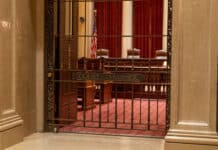
(The Daily Signal) — The House voted to pass a spending bill to keep the government running at current levels through early 2024 — with no new funding for border security, Israel, or Ukraine.
The continuing resolution, which passed 336 to 95, also has no spending cuts. Ninety-three Republicans and two Democrats voted against the bill, while one Republican and two Democrats did not vote.
New House Speaker Mike Johnson, R-La., proposed the temporary spending measure over the weekend. The bill continues funding the government at current levels for one set of agencies until Jan. 19 and another set of agencies to Feb. 2.
However, it has no spending cuts and no additional border security. The bill also has no emergency funding for either Israel or Ukraine, which President Joe Biden has requested.
The measure had to win a two-thirds majority to pass.
“House conservatives must stick to their commitments on government spending,” says Kevin Roberts, president of The Heritage Foundation, in a statement. “Now is the time to draw a line in the sand: No more continuing resolutions at the bloated fiscal year 2023 spending level.”
“This continuing resolution has bought two months of time in which Republicans must, at long last, get their act together and pass 12 conservative appropriations bills,” Roberts adds. “No more continuing resolutions, no more omnibus bills, no more minibuses. Period. The American people are tired of being asked for an extension on a long-overdue assignment.”
(The Daily Signal is the news outlet of The Heritage Foundation.)
“The two-step CR achieves the critical goal of avoiding a disastrous Christmas omnibus spending package,” Johnson posted Tuesday morning on X, the social media platform formerly known as Twitter. “We are changing the way Washington works.”
The two-step CR achieves the critical goal of avoiding a disastrous Christmas omnibus spending package.
We are changing the way Washington works. pic.twitter.com/6dvjYgcS6F
— Speaker Mike Johnson (@SpeakerJohnson) November 14, 2023
Rep. Chip Roy, R-Texas, strongly opposed the measure.
“Inflation is taxing American paychecks, interest payments on our $33 trillion national debt are exploding, and Moody’s just downgraded our debt outlook to ‘negative,’” Roy said in a statement after voting no. “This [continuing resolution] fuels Washington’s spending addiction while funding direct attacks on our security, prosperity and way of life: Biden and [Homeland Security Secretary Alejandro] Mayorkas’ open border policies, anti-Israel UN programs, government-wide diversity and [critical race theory] programs, abortion tourism and transgender surgeries at the Pentagon, a weaponized [Justice Department], anti-energy policies, and too many others to list.”
The House Freedom Caucus, a group of conservative lawmakers, issued a statement asserting that Republicans must “stop negotiating against ourselves,” and need to demand bold changes.
“The House Freedom Caucus opposes the proposed ‘clean’ Continuing Resolution, as it contains no spending reductions, no border security, and not a single meaningful win for the American people,” the House Freedom Caucus statement says. “Republicans must stop negotiating against ourselves over fears of what the Senate may do with the premise of ‘roll over today and we’ll fight tomorrow.’”
HFC Official Position on CR: No More “Rolling Over Today To Fight Tomorrow” pic.twitter.com/8rE2VbRCbe
— House Freedom Caucus (@freedomcaucus) November 14, 2023
Senate Majority Leader Chuck Schumer, D-N.Y., seemed to almost endorse the plan on Tuesday, which now goes to the Senate.
“The House proposal does two things that Democrats have pushed for: It will avert a shutdown, and it will do so without making hard right cuts that the extreme MAGA wing demands,” Schumer posted on X.
We have until Friday to avert another unnecessary government shutdown.
The House proposal does two things that Democrats have pushed for:
It will avert a shutdown, and it will do so without making hard right cuts that the extreme MAGA wing demands.
— Chuck Schumer (@SenSchumer) November 14, 2023
Other Republicans voiced opposition.
Rep. Jim Banks, R-Ind., who, like Johnson, is a former chairman of the conservative Republican Study Committee, announced the Johnson proposal would continue funding “Bidenomics.”
A “clean CR” is a vote to keep funding Bidenomics, the open border and to continue $2 Trillion annual deficits.
I’m a no!
— Jim Banks (@RepJimBanks) November 14, 2023
In lieu of some temporary funding measure for federal agencies, a small portion of the overall federal workforce classified as “nonessential” would be furloughed, or would be off work, but still receive backpay for unworked days. National security agencies, Border Patrol, Social Security, and other federal functions that affect people will continue.
The longest government shutdown in history was just 35 days, according to USA Today.

















